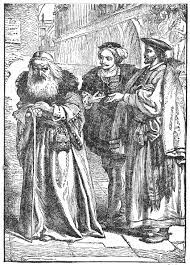MERCHANT OF VENICE Act I: Scene 3
Summary
Bassanio seeks to find a sound money lender who could lend such a huge amount as three thousand ducats in one go. Eventually, he finds out Shylock, a Jewish moneylender. He agrees to lend him the money to Antonio's credit. It means Antonio will remain the guarantor should Bassanio fails to pay the money. Shylock is hesitant.
He has the confidence that Antonio is a rich man, but he averse to his risky investments in his merchant fleet. Antonio's ships are bound for distant places, and therefore vulnerable to many perils at sea. He refuses Bassanio's invitation to dinner. He says that he will do business with Christians, but it is against his principles to eat with them because they eat pork which is religiously prohibited to him.
When Antonio arrives at the scene, Shylock (aside) expresses (thinks) his deep contempt against him, saying that he hates Antonio because he is a Christian. He expresses his direct hatred towards Shylock for his religious outlook. Allegorically, he behaves as if he spits on Shylock’s beard and garbendine, both a religious symbol of being a devout Jew.
Antonio has caused him losses financially. He would lend out money to the needy Merchants without charging any interest. As a result, Shylock’s money remains idle and his rate of interest comes down causing him business losses.
Antonio, according to Shylock, would denounce him socially too. He would criticise him before his friends at Rialto and would thus turn away their favour from him and instigate his enemies.
Finally Shylock agrees to lend Bassanio the three thousand ducats. Antonio says that he never lends nor borrows money by taking or giving interest as a devout christian. Yet because of his friend Bassanio's pressing need, Antonio is willing to break this rule. The term of the loan will be for three months, and Antonio will have to execute a bond as security.
While Bassanio and Antonio wait to know how much Shylock will charge for the loan, Shylock slyly devises a trap to nail Antonio. He plans to goad him into agreeing on the extraction of his pound of flesh leading to his own loss of life eventually.
He tells them about the biblical story of how Jacob increased his herd of sheep. Shylock then accuses Antonio of having repeatedly spit upon him and called him a dog to rake up old sentiment. Antonio and Bassanio have come asking him for money. Yet they pride themselves that Antonio is a virtuous man because he lends money to friends, with no interest involved. This trap leads Antonio into saying that Shylock may regard it as a loan to an enemy if he wishes. Shylock seizes this opportunity and says that he wants Antonio's friendship, and to prove it, he will advance the loan without charging a penny of interest. But just to make this transaction look like a "a merry sport," Shylock wants a penalty clause providing that if Antonio fails to repay the loan within the three months’ time, Shylock will have the right to cut “a pound of flesh" from any part of Antonio's body.
Bassanio objects to Antonio’s risking his own life for his sake, but Antonio assures him that long before the loan is due some of his ships will expectedly return from abroad and that he will be able to repay the loan three times over. Shylock says that this penalty is merely a jest. He would gain nothing by exacting the forfeit of a pound of human flesh, which is not even as valuable as mutton or beef. The contract is agreed to and Antonio consents to Shylock's terms.
Analysis
This scene has two important aspects from the viewpoint of the audience. It exposes the two major plots of the play. Antonio agrees to Shylock's bond with the penalty of three thousand ducats for a pound of flesh. Secondly, this scene introduces Shylock to the audience. Shakespeare makes it amply clear why Shylock qualifies to be the most powerful dramatic figure in the play and why so many great actors have regarded this part as one of the most rewarding roles in all Shakespearean dramas.
Shylock enters first; Bassanio is following him, trying to get an answer to his request for a loan. Shylock's hesitant response ("Well . . . three months . . . well") avoids a direct answer to Bassanio's request. Bassanio behaves like a pestering child badgering an adult. Throughout the whole scene, both Bassanio and Antonio often seem naive and gullible in contrast to Shylock. In those days three thousand ducats was a huge sum. No single moneylender could cough it. Shylock was the heavy moneylender capable of single handedly lending it.
Bassanio demands for a direct answer. Shylock evades answering straightforwardly.
At Antonio's entrance, Shylock is given a lengthy aside in which he addresses himself directly to the audience. Shakespeare often uses the devices of asides and soliloquies to allow his heroes and, in this case, his "villain," a chance to immediately make clear his intentions and motivations to the audience. His sly nature becomes evident to the audience.
Shylock's hatred for Antonio becomes immediately evident in the drama. He expresses his wish to catch Antonio "upon the hip" and "feed fat the ancient grudge I bear him."
Shylock is called back from the front of the stage by Bassanio, and he pretends to notice Antonio for the first time. Their greeting has ironic overtones showing hard feelings to each other. There then follows a debate between Antonio and Shylock on the subject of taking of interest on a loan. It may be permissible for Shylock but not for Antonio, according to Antonio's Christian code.
Shakespeare builds up a dramatic crisis. Antonio's mounting impatience leads to increased arrogance - he compares the moneylender to the "apple rotten at the heart."
Shylock pretends to muse on the heavy amount of the loan, for, he can’t for himself, produce the entire amount. But, he may try it jointly with another Jewish money lender, Tubal. Shylock takes time to remind Antonio that such a huge amount can only be arranged by him. But, he reminds him of his cold, enemy-like behaviour at Rialto. This is a shrewd ploy. It drives Antonio into agreeing to the bond term like an enemy, eventually risking his own life to peril. Shakespeare is manipulating emotionally.
Shakespeare has set up a situation in which a man has put his life in the hands of his sworn enemy and the outcome depends on fortune, which is safe return of his merchant fleet. Antonio and Shylock are diametrical opposites. Shylock is cunning, cautious, and crafty. As a Christian, Antonio is easy-going, trusting, alone and sad.
Shylock bears vengeance, Antonio trusts his friend Bassanio even to the extent of losing his life.







No comments:
Post a Comment
Thanks for your views. We will work on it. Meanwhile, do visit this blog for an interesting Article tomorrow. Have a nice day.